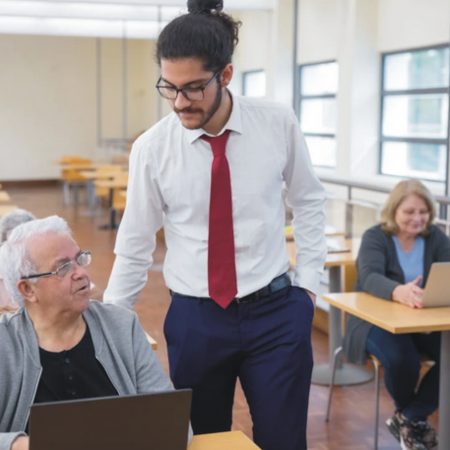How to Apply for a Student Visa: A Step-by-Step Guide for International Students
Studying abroad is an exciting opportunity to gain a world-class education, experience new cultures, and broaden your horizons. However, before you can pack your bags and begin this transformative journey, you will need to navigate the process of obtaining a student visa.
A student visa is an official document that allows international students to enter and stay in a foreign country for the purpose of education. While the application process may seem a little bit difficult, this comprehensive guide will help you understand how to apply for a student visa and set you on the path to academic success.

How to Apply for a Student Visa
If you want to know how to apply for a student visa, then read through the step-by-step guide explained below.
1. Understand the Requirements for a Student Visa
Each country has specific requirements for issuing student visas, so it’s essential to research the criteria for your chosen destination. Most student visa applications require the following:
- A valid passport
- Proof of acceptance into a recognized educational institution
- Evidence of sufficient financial support
- Medical insurance (if applicable)
- A clean criminal record
- Proof of English proficiency (e.g., TOEFL, IELTS)
Tips:
Visit the official immigration website of the country you plan to study in to confirm the specific requirements.
Make a checklist to ensure you meet all the criteria before starting your application.
2. Choose Your Destination and Educational Institution
Before applying for a student visa, you must decide where you want to study and secure admission to a recognized institution.
Key Steps:
- Research universities or colleges in your preferred country.
- Ensure the institution is approved by the government for issuing a student visa.
- Submit your application and wait for an acceptance letter.
Important Note:
Your acceptance letter is a crucial document for your visa application, so keep it safe and readily accessible.
3. Determine the Type of Visa You Need
Some countries offer different types of student visas based on the duration and level of your studies.
Examples:
- Short-Term Study Visa: For courses lasting less than six months.
- Long-Term Study Visa: For degree programs or courses exceeding six months.
- Specialized Student Visa: For vocational or exchange programs.
Check with your destination country’s immigration department to identify the correct visa type for your program.
4. Gather the Required Documents
Proper documentation is the backbone of a successful student visa application. While requirements may vary, here are the most commonly requested documents:
Valid Passport: Ensure your passport is valid for the entire duration of your study.
Acceptance Letter: A formal letter from your chosen institution confirming your admission.
Financial Proof: Bank statements, scholarship letters, or sponsor guarantees showing you can cover tuition and living expenses.
Language Proficiency Test Results: TOEFL, IELTS, or equivalent scores, if required.
Health Certificate: Proof of vaccinations or a medical fitness certificate, depending on the country.
Visa Application Form: Complete this form accurately and honestly.
5. Pay the Application Fee
Most countries charge a fee to process student visa applications. Payment methods typically include online payment, bank transfer, or payment at a visa application center.
Tips:
Keep the payment receipt as proof, as it may be required during your visa appointment.
Confirm the exact fee on the official website of the destination country.
6. Submit Your Application Online or In-Person
Many countries allow online submission of visa applications, while others require you to visit their embassy or consulate in person.
Key Steps:
- Complete the application form online or download a physical copy if required.
- Upload or attach all necessary documents.
- Pay the visa processing fee.
- Schedule an appointment at the nearest consulate or visa application center.
Pro Tip:
Double-check your application to avoid errors that could lead to delays or rejection.
7. Attend the Visa Interview (If Required)
Some countries require a visa interview to assess your intentions, financial capacity, and academic goals.
Common Interview Questions:
Why did you choose this country for your studies?
What is the name of the institution and course you’ve enrolled in?
How do you plan to fund your education?
Do you intend to return to your home country after completing your studies?
Tips for Success:
Be honest and confident.
Carry all required documents, including your acceptance letter and proof of financial means.
Practice answering potential questions to ensure smooth communication.
8. Wait for Visa Approval
Once you have submitted your application and attended the interview (if applicable), it’s time to wait for your visa to be processed. Processing times vary depending on the country, ranging from a few weeks to several months.
Tips to Expedite the Process:
Submit your application well in advance to avoid delays.
Check your email regularly for updates or requests for additional documents.
9. Prepare for Your Departure
After receiving your student visa, it’s time to make final preparations for your journey.
Final Checklist:
Book your flight to your destination.
Arrange accommodation near your educational institution.
Purchase health insurance if required.
Familiarize yourself with the country’s customs, laws, and culture.
FAQs on How to Apply for a Student Visa
Below are some frequently asked questions associated with how to apply for a student visa.
Q: How long does it take to process a student visa?
A: Processing times vary depending on the country, but it usually takes 4-8 weeks. Apply early to avoid delays.
Q: Can I work on a student visa?
A: Many countries allow international students to work part-time, but restrictions vary. Check the specific rules of your destination.
Q: What if my visa is denied?
A: If your visa is denied, review the reasons provided and consider reapplying after addressing the issues. Seek advice from an immigration consultant if needed.
Q: Do I need to show proof of funds?
A: Yes, most countries require evidence that you can financially support yourself during your studies.
Final Thoughts
Applying for a student visa might seem overwhelming, but with proper planning and organization, you can navigate the process smoothly. By understanding the requirements, gathering the necessary documents, and staying proactive, you’ll be well on your way to achieving your dream of studying abroad.
If you are ready to start your journey, begin by researching the visa requirements for your chosen destination and take the first step toward an enriching academic experience!
Are you planning to apply for a student visa? Share your questions or experiences in the comments below!








